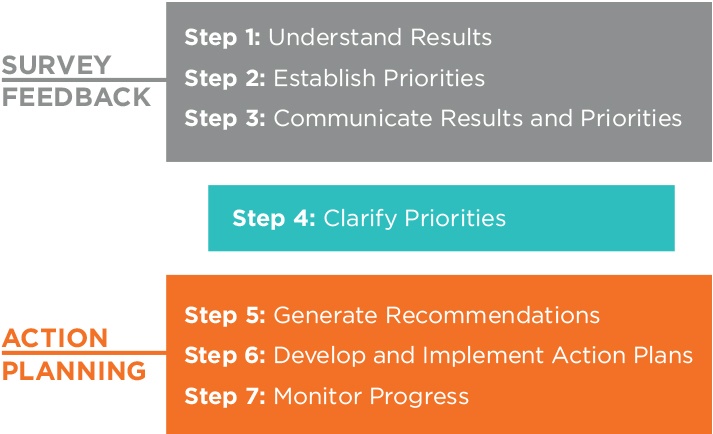
 More than half (53 percent) of U.S. companies with 500 or more employees conduct employee engagement surveys. However, more than a third of managers do not act on the results of these surveys. The implications of this inaction, which has held at a relatively constant rate for several years, are particularly significant in today’s business environment in which high turnover rates and historically low unemployment converge to reduce capacity for achieving growth forecasts.
More than half (53 percent) of U.S. companies with 500 or more employees conduct employee engagement surveys. However, more than a third of managers do not act on the results of these surveys. The implications of this inaction, which has held at a relatively constant rate for several years, are particularly significant in today’s business environment in which high turnover rates and historically low unemployment converge to reduce capacity for achieving growth forecasts.
Failure to act on engagement survey results reduces the credibility of leadership, reinforces the notion that management doesn't respect the opinions of employees in achieving organizational change and leads to increased levels of employee disengagement.
Why don’t managers act on survey results?
There are three predominant reasons why managers fail to act on survey results.
- Senior leadership has not established survey follow-up as an important business priority
- Managers don’t have the tools and guidance they need to prioritize issues for action planning
- Organizations lack processes for holding managers accountable for implementing changes that will drive measurable business improvements
Our latest Trendicators Best Practices report, Helping Managers Take Action on Survey Results, presents a seven-step framework for HR practitioners to translate the results of employee engagement surveys into meaningful organizational change. Written by internationally recognized engagement survey expert Jack Wiley, Ph.D., this eBook offers insights gained from Jack’s extensive experience in supporting organizations in almost all major industries in most major economies around the world.
The Seven-Step Model for Survey Feedback and Action Planning

The model, shown above, helps an organization know where it is starting and where it is headed. The easy-to-follow process has been used by hundreds of organizations to achieve organizational improvement objectives. The model applies the fundamental philosophies of organizational development to employee survey methodology.
Helping Managers Take Action on Survey Results provides practical advice for following each of the steps in this model, along with best practice advice from a survey of 31 HR practitioners who manage employee surveys with their organizations.
The business benefits of acting on engagement survey results are overwhelmingly positive.
- Employers who conduct engagement surveys enjoy engagement scores that are 38% higher than those who don’t.
- Employees who said their manager acted on engagement survey results show favorability levels for key engagement indicators that are, on average, twice as high as the favorability levels of employees with managers who did not take follow-up action.
- Employees whose managers acted on survey results are more than twice as likely to recommend their organization as a great place to work.
Enjoy the read!
At Engage2Excel, we believe that HR departments have an unprecedented opportunity to lead talent-driven transformation initiatives that drive bottom-line results. This eBook concludes our three-part series on creating a talent-driven competitive advantage.



